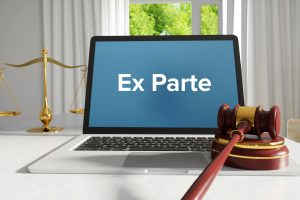COVID-19 has affected all sectors of the U.S. population. The Governor of California, Gavin Newsom, has issued stay-at-home orders for all residents, with limited exceptions for “essential works.” In California alone, over 1 million workers have filed for employment benefits. The San Diego Courthouses have all closed to the public and were only processing temporary restraining orders. As of April 8, 2020, the Superior Courts have expanded their accessibility slightly allowing for limited Ex Parte (emergency) Hearings. Since the Court’s official closure in mid-March, it is believed the Court has received over 7,000 documents via U.S. Mail. None of these documents have been processed during the closure. This figure does not account for the presumably high number of Court filings that have been postponed or the number of hearings that were scheduled to occur during the 2 ½ months the Court has been closed. Those hearings will have to be continued to a date in the future. So, what can we expect once the Courts are able to re-open in any capacity? Continue reading
Articles Posted in Spousal Support
Spousal Support and Termination
One of the hot button issues in any divorce case is spousal support. Standard questions that might float through a party’s mind include, but are not limited to, “what party will pay support?”, “how much support will I pay/receive?”, and “how long will I pay/receive support for?” This blog will focus on spousal support duration and termination. For information regarding how spousal support is calculated, please review one of our other blog posts or call our office for more information. 
In California, “except on written agreement of the parties to the contrary or a court order terminating spousal support, the court retains jurisdiction indefinitely in a proceeding for dissolution of marriage or for legal separation of the parties where the marriage is of long duration.” (See California Family Code section 4336(a)(emphasis added.) Pursuant to Family Code section 4336(b), a marriage of long duration includes any marriage (from the date of marriage to the date of separation) lasting 10 years or longer. Therefore, in California, the court generally retains jurisdiction to make spousal support orders for marriages lasting 10 years or longer. Continue reading
Common Types of Discovery in a Divorce Proceeding
 Once the initial paperwork in a divorce proceeding is filed, both parties must complete what is called a “Preliminary Declaration of Disclosure.” This disclosure mainly consists of two documents, the first is the party’s “Schedule of Assets and Debts” and the second is the party’s “Income and Expense Declaration.” Just as the names imply, these forms are designed to gather information related to each parties’ assets, debts, income, and expenses. In addition to being mandatory, these disclosures are due early on in the case and are extremely important as they will be the framework for which a settlement, if possible, is reached. Continue reading
Once the initial paperwork in a divorce proceeding is filed, both parties must complete what is called a “Preliminary Declaration of Disclosure.” This disclosure mainly consists of two documents, the first is the party’s “Schedule of Assets and Debts” and the second is the party’s “Income and Expense Declaration.” Just as the names imply, these forms are designed to gather information related to each parties’ assets, debts, income, and expenses. In addition to being mandatory, these disclosures are due early on in the case and are extremely important as they will be the framework for which a settlement, if possible, is reached. Continue reading
What is an Ex Parte Hearing?
It is no secret that the San Diego Family Law Courts are overutilized, overworked, and overbooked. When a party files a motion with the court it can often take several months, or longer, to get a hearing date! This can be frustrating for litigants who want to move their case forward towards closure. But what happens when an emergency comes up in your case and you cannot wait months for a hearing date? Luckily, there is a procedure and solution to allow the court to hear an emergency issue within a day or two, and that is called an “Ex Parte” hearing. At an Ex Parte hearing, judges can make temporary emergency orders, when appropriate.
Pursuant to California Rules of Court, Rule 5.151(b), “[t]he purpose of a request for emergency orders is to address matters that cannot be heard on the court’s regular hearing calendar….[and] the process is used to request that the court: Continue reading
SPOUSAL SUPPORT BASICS
The infamous comedian-actor Robin Williams once said, “Divorce is expensive. I used to joke they were going to call it ‘all the money,’ but they changed it to ‘alimony.’”
Alimony, or more commonly now called spousal support, may be awarded to either spouse during the pendency of a divorce proceeding, or in some cases after Judgment has been entered. There are two types of spousal support: (1) Temporary; and (2) Permanent. Continue reading
Support and Severance Pay
 The COVID-19 pandemic has disrupted all American’s lives and created a trickle-down effect upsetting aspects of our lives many did not originally anticipate. Federal and State governments have blown the metaphorical whistle signaling the changing of tides and ordering the closure of stores, schools, government offices, and generally life as we have known it.
The COVID-19 pandemic has disrupted all American’s lives and created a trickle-down effect upsetting aspects of our lives many did not originally anticipate. Federal and State governments have blown the metaphorical whistle signaling the changing of tides and ordering the closure of stores, schools, government offices, and generally life as we have known it.
The Department of Labor reported over 6.65 million Americans filed for unemployment insurance last week. In California alone, almost one million claims were filed in the last two weeks.
Of the myriad of people facing loss of employment amid the pandemic, some will be fortunate enough to receive severance packages as they make their exit. Whether this feels fortunate or not will likely depend upon the following information regarding how severance pay is handled by the Court for support purposes. Continue reading
Money to Spare – How it Affects the Marital Standard of Living
Ex-Union-Tribune owner Douglas Manchester has divorced from his second wife, Russian immigrant Geniya Derzhavina. Douglas, a wealthy real estate developer, filed for dissolution of marriage in October 2019 and the parties settled their divorce just two months later.
Douglas married his first wife, Betsy, in January 1965. They divorced in 2013 after 48 years of marriage. Douglas and Betsy’s divorce lasted four years and Betsy highlighted the couple’s lavish standard of living throughout the proceeding. Betsy claimed, amongst other things, that in 2007 the parties threw a birthday party for Douglas that cost over $200,000. The parties then flew on a private jet to Costa Rica where they spent a week on a private chartered yacht. Betsy claims the Costa Rica trip cost more than $350,000. Continue reading
Divide and Conquer!!
For most people, the decision to get divorced is not reached on a whim. More often than not, “Breaking up is like knocking over a Coke machine. You can’t do it in one push. You gotta rock it back and forth a few times, and then it goes over.” (-Jerry Seinfeld)
It is not uncommon for those going through the divorce process to at some point become frustrated by the amount it is taking to, what in itself sounds simple, end their marriage! While sometimes bittersweet, many people returning to checking the “single” box, provides, a sense of progress, relief, satisfaction, accomplishment, or even freedom. This is especially true for those who have been enmeshed in lengthy highly contentious and stressful litigation. Continue reading
Amazon Tycoon Jeff Bezos Divorce
Earlier this year, Amazon tycoon Jeff Bezos announced his divorce from wife MacKenzie after 25 years of marriage and four children together. The couple met and married before Jeff founded Amazon. Jeff, who has a reported net worth of nearly $157 billion is the world’s richest man.
The couple, who allegedly did not have a premarital agreement, reside in Washington state. Washington is a community property state similar to that of California. That means that generally all assets and debts acquired during marriage will be divided equally.
Despite the couple’s massive estate, the couple finalized their divorce in July 2019, just 7 months after making the announcement. MacKenzie Bezos will get, amongst other property, 25% of the couple’s Amazon stock, an amount equal to roughly $38 billion. This stake in Amazon makes MacKenzie the third richest woman in the world. https://www.businessinsider.com/jeff-mackenzie-bezos-divorce-official-settlement-38-billion-2019-7 She has promised to donate at least half of her fortune to charity!
Types of Experts
In a previous blog, we talked about different classes of experts (Joint, Hired Gun, Review) employed in family law cases. In this blog, we will talk about the different “types” of experts we use in family law.
Forensic Accountant
Forensic accounting is a specialty practice area of accounting that is used in litigation. Forensic accountants are used in family law to perform tracings for separate and community property, to investigate Family Code Section 2640 reimbursement claims, Moore/Marsden calculations, to analyze/characterize stock options, and other issues which require an “investigation” of accounting issues.
What separates forensic accountant from regular accountants is specialized training focused on investigation as well as the expectation that the outcome of their investigation will result in the preparation of reports suitable to serve as evidence in a court of law. Continue reading
 San Diego Divorce Attorneys Blog
San Diego Divorce Attorneys Blog





